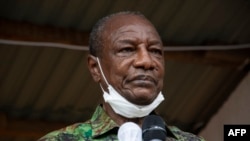The sanctions would block any U.S. assets and criminalize transactions with the West African nation's former president, who had cordial relations with the United States before seeking to amend the constitution to stay in power.
Conde, 84, became the first democratically elected president of the turbulent country in 2010. But after two terms, he was accused of rising authoritarianism, culminating in a bloody crackdown in 2020 on protesters.
The U.S. Treasury Department said Conde was being sanctioned for leading an entity that has "engaged in serious human rights abuse."
Conde directed security forces to use violence against the opposition ahead of a 2020 referendum that enabled him to seek a third term as well as afterward, a Treasury Department statement said.
"Among other incidents, security forces reportedly fired live bullets into crowds that had gathered to celebrate the victory announcement of Conde's opposition and shot two minors, killing one, and shot another in the back as he ran away," it said.
In Guinea, Conde is facing prosecution along with more than 180 other officials and ex-ministers for alleged corruption.






